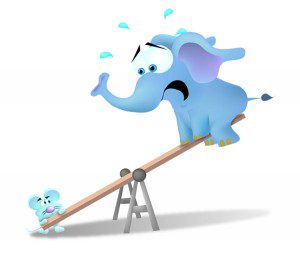 There are fives essential areas to develop when it comes to improving your guitar playing skills. These five areas not only make up what you know and can do on the guitar, but also work together synergistically in a way that makes your playing greater than the sum of its parts. However, it is extremely common for guitarists to spend more time working on certain areas than others which leads to an imbalance of ability.
There are fives essential areas to develop when it comes to improving your guitar playing skills. These five areas not only make up what you know and can do on the guitar, but also work together synergistically in a way that makes your playing greater than the sum of its parts. However, it is extremely common for guitarists to spend more time working on certain areas than others which leads to an imbalance of ability.
Are you out of balance? Take a look at these twelve signs that point to an imbalance of some kind in your playing and how to improve them:
1. You can play fast, complex, technical exercises, but can’t play any real music
Technical skill is often prized by guitarists as being the ultimate goal to strive for; if you can “shred” than you are a great player. However, there is more to being a great player than just playing fast. As great as it can feel to cram as many notes together as possible, if you aren’t actually saying anything meaningful with your notes, no one will want to listen to you.
There is nothing wrong with building up a high level of playing ability on your guitar, but it should never be developed for its own sake. The very best players not only have a tremendous amount of technical ability, but they have also spent a lot of time becoming musical – they have crafted a voice on their that lets them actually play something worth listening to.
Solution: Develop your musical understanding and spend more time learning to play real music; i.e. songs, solos, riffs, licks, etc.
2. You avoid learning and playing solos, or you just call yourself a “rhythm” guitar player
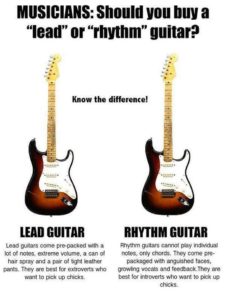 If you tend to shy away from learning songs that have solos – or maybe difficult solos – then chances are that your abilities are off balance.
If you tend to shy away from learning songs that have solos – or maybe difficult solos – then chances are that your abilities are off balance.
Learning to play solos and other melodic parts on the guitar can be extremely time consuming and often requires a higher level of technical ability compared to rhythm parts. But, solos are essential in most styles played on the guitar including rock, blues, jazz, metal, and country. Once you have paid your dues building up your chops, learning solos will become a lot easier to do anyway.
If you aren’t learning or playing solos because you call yourself a “rhythm” guitarist – stop it! Do you think Jimi Hendrix thought of himself as either a rhythm or lead player? Of course not! He was just a “guitar player”, plain and simple. Regardless of your aspirations, you should develop your rhythm and lead playing abilities so that you can play what is needed for your chosen style of music.
Solution: Stop thinking about being a “rhythm” or “lead” player; just be a guitarist. Develop your technical abilities so that you aren’t intimidated by soloing.
3. You can play many riffs, licks, songs, or solos, but you can’t explain what you are playing
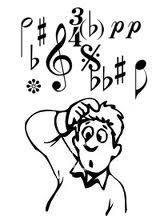
How well do you know what you are actually playing on your guitar?
Is it just a seemingly random bunch of fret and string numbers grouped together, or do you see the bigger picture of what is going on?
Maybe you just rely on muscle memory to know where your fingers are supposed to go on the fretboard?
If so, then your understanding of what you are playing is certainly out of balance. Although you can play your guitar, you are only really working with a surface-level understanding.
If this sounds familiar, then don’t’ worry, because it means there is room to grow and improve. By going even one level deeper in your understanding, your guitar playing will improve tremendously.
Without knowledge, any skill you have can’t be effectively used. In order to take your playing abilities further, you will need to develop a deeper understanding of what it is that you are playing.
The biggest benefits in doing this will be that you gain a better ability to know when and how to use all of the things that you’ve learned..
Solution: You need to spend time learning how music works and what you are really playing on your guitar. This will mean learning more about music theory. As a starting point, you will need to, learn and memorize the notes on your fretboard.
4. You struggle to communicate with non-guitarists about what you are playing
What would you do if you had to explain what you are playing on your guitar to a pianist? What about to a saxophone or trumpet player? How about to a drummer?
Assuming they have no understanding of the guitar at all, it probably wouldn’t go so well…am I right?
Another guitarist might understand what you are mean because they “speak” your particular musical dialect – they talk guitar, just like you do. They understand what you mean when you explain things in terms of strings, frets, or chord shapes, but non-guitarist don’t!
To overcome this challenge, you need to learn the universal musical language of music theory. More importantly, you need to be able to use theory to understand and explain what you do on your guitar.
This is easier said than done as many guitarists learn to play by ear, lifting riffs and licks from recordings, without the need for reading, theory, or the like.
Music can be thought of as its own language. Part of the reason the different ideas of music theory exist in the first place is to allow musicians to communicate their ideas; they need to speak the same language.
Although it is possible for you to create your own unique way of organizing musical information, if you can’t at least translate what you are doing to a form that other musicians understand, no one will want to play music with you.
Solution: You need to work on your understanding of music theory as it is universal to all musicians.
5. You know a lot about music theory, but can’t use those ideas with real music
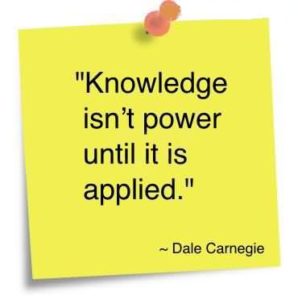 Learning music theory is great, but there is a catch – you have to be able to actually use the ideas you’ve learned for them to be useful. Knowledge that is never applied is a waste.
Learning music theory is great, but there is a catch – you have to be able to actually use the ideas you’ve learned for them to be useful. Knowledge that is never applied is a waste.
Solution: You need to spend less time reading about theory and more time applying it on your guitar. Learning the notes of your guitar will help with this.
6. You can only learn new material using sheet music
Music is an aural medium which means that your ears can be one of your most valuable assets.
Not everything that is out there for you to learn will be available in a written form, so you’re going to have to develop your ability to learn it by ear.
Plus, developing your ears comes with a range of other benefits including being able to play ideas you hear in your head, improving your songwriting, speeding up memorization, and even predicting how music will move as you improvise.
Solution: You need to spend time developing your aural skills. Spend time working out songs and ideas by ear. Also, spend time transcribing music – writing out what you learn by ear.
7. You have to learn new material by hearing it – you can’t read
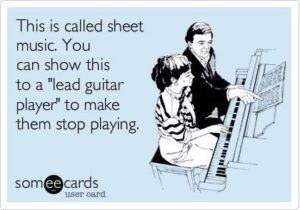 Just because you are a guitarist doesn’t mean it’s okay for you to be musically illiterate. There are going to be times when you have to learn a piece of music that is either brand new and never been played, has never been recorded, or that you have no time to listen to beforehand. This is when reading because critical.
Just because you are a guitarist doesn’t mean it’s okay for you to be musically illiterate. There are going to be times when you have to learn a piece of music that is either brand new and never been played, has never been recorded, or that you have no time to listen to beforehand. This is when reading because critical.
Learning to read as a guitarist doesn’t just mean reading standard notation. In today’s modern world there are a variety of different written forms of music that guitarists will need to become familiar with at one point or another.
Specifically, the written musical forms for guitar are guitar tablature, basic rhythmic notation, chord diagrams and charts, and yes, even music notation.
You don’t have to learn them all at once but can gradually become comfortable with them over time.
Reading music is a skill like any other and in order to build that skill, you just need to invest a little time every day to improve it.
Solution: You need to develop your reading skills, which could involve reading charts, tablature, and musical notation. Work on it a little bit every day.
8. You have to play everything exactly like the original – you can’t make the song your own
There is a plethora of great guitarist out there to learn from, but make no mistake – you will never, ever be them as a player no matter how hard you try.
This is not only the cruel reality of learning to play the guitar (damn you, Yngwie Malmsteen), but it is also a much more mature way of looking at becoming a great player. Why try to be a poor rip-off of someone else when you can be an unbelievable player in your own right?
There is a time and place to play a piece of music exactly the way it was originally played and recorded. This might include trying to learn from a great player or if you are working with a tribute or cover band. But, outside of this, it is vital to your individual playing abilities to take what you learn and make it your own. Put your own spin on it, reshape it slightly, or work to create your own voice through your guitar.
Solution: You need to spend time developing your improvisational skills and building your own interpretations of the songs that you play.
9. You get lost while soloing or improvising
 This normally means that you are losing track of where you are in the music as you solo – you aren’t able to keep track of the chord progression or how much time has passed while you are soloing.
This normally means that you are losing track of where you are in the music as you solo – you aren’t able to keep track of the chord progression or how much time has passed while you are soloing.
Getting lost like this may lead to playing too long and running into another person’s solo (they will be pissed; I know I would be) or may even cause you to play the wrong notes if the chords have changed.
In any case, you need to be able to keep track of where you are as you are soloing. Chances are you need to work on improving your ability to hear how what you are playing fits with the rest of the music or just count out the bars.
At first, it may seem hard to play anything with real meaning while keeping track of the rest of the music. but in time you will be able to “feel” where the changes are instinctively.
Solution: You need to spend time listening to the backing music as you are soloing. Try counting out loud while you play.
10. You are limited to creating or improvising in specific areas of the fretboard
 How many times have you been improvising only to lose track of where the right notes are outside of the safety of the Minor Pentatonic scale?
How many times have you been improvising only to lose track of where the right notes are outside of the safety of the Minor Pentatonic scale?
Well, if it is more than once, you aren’t alone.
Most guitarists struggle to improvise freely across the entire fretboard. However, it is important to recognize that this needs to be fixed if you want to be a great player.
Do you think Joe Satriani or Steve Vai get lost when they are improvising? Nope, and that is because they have spent the time needed to open up the entire fretboard to be used for soloing.
There are a number of things that you will need to work on to overcome this issue including improving your note awareness, the number of scale shapes you know, and even learning more music theory.
Try not to get discouraged thinking about how much there is to learn; the key is to work on a little bit of the fretboard at a time and just get really good at that part. Then you can move on to another little part and get good there. Repeat it over enough times and eventually, the entire fretboard becomes your plaything.
Solution: You need to learn and master more scale and arpeggio patterns for soloing. You will also need to learn the theory that supports those new patterns, as well as be able to see the notes on your fretboard.
11. You are limited to creating or improvising in specific musical keys
 There are a number of keys which are convenient to play on the guitar because of its tuning, specifically E, A, D, and G. However, other instruments tend to favor any number of different keys which means that there will be times when you have no choice about what key the music will be in.
There are a number of keys which are convenient to play on the guitar because of its tuning, specifically E, A, D, and G. However, other instruments tend to favor any number of different keys which means that there will be times when you have no choice about what key the music will be in.
Singers are often the worst for this as they require you to play songs in keys that suit their voice.
Regardless of the needs of other musicians, if you want to be a competent and complete guitarist you need to develop your ability to play in any key. Ideally, you should be as comfortable soloing in the more challenging keys as you are with the easier ones.
One tactic I like to employ is rotating the keys I practice on a daily basis – essentially choosing a “Key of the Day.” Doing this will force you to work in every key evenly and for an extended period of time, not just a few minutes.
Solution: You need to practice scales, chords, and arpeggios in all keys. Force yourself to play and improvise in all 12 keys of music and try doing a “Key of the Day.”
12. You have a lot of playing skill and knowledge, but you can’t play a single song all the way through
 Nothing is more embarrassing than having someone ask you to play a song, play a part of it, and then having them say “Where’s the rest?”
Nothing is more embarrassing than having someone ask you to play a song, play a part of it, and then having them say “Where’s the rest?”
Trust me, I’ve been there and it sucks.
Playing complete songs should be one of your biggest priorities when learning to play the guitar; this means that you play the song in its entirety, from start to finish, without having to stop.
Nobody wants to hear how good you are at playing a handful Van Halen licks or just the opening riff of “Back in Black” – they want to hear the whole song!
If you’ve spent your time building a collection of cool riffs and licks, but can’t play a complete song, don’t worry. You’re already part of the way there, but you will need to stop jumping around from riff-to-riff and focus on finishing entire songs.
If you have to, choose to learn something that is really simple; maybe something that doesn’t have a solo in it for starters. Finishing an easy song like this will help give you confidence in your playing skills and will build momentum to overcome more difficult pieces.
Solution: You need to focus on learning entire songs from start to finish. Build up a list of songs that you can play in their entirety.
Did any of these issues ring true for you? Are there any other challenges that you’ve encountered that may be due to an imbalance in your playing skills. Tell me about it in the comments below.

